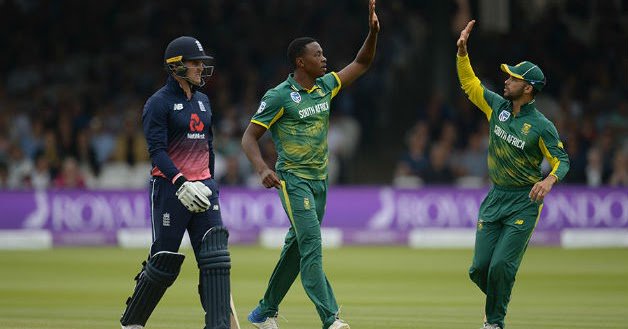Kagiso Rabada says living in a bio-secure bubble is tough, but adds that players are fully aware of their privilege.
By the time the three ODI and three T20I series between South Africa and England ends, players from those squads who’ve been involved in the Indian Premier League will have been in a bio-secure bubble for nearly five months.
Many will not have seen loved ones for the duration of that period, or only for a couple of days. Their lives would have been fundamentally transformed, with even the most basic daily freedoms compromised.
Rabada says the mental toll of that is significant and likened the experience to incarceration, but quickly added that they are fully aware of their privilege as players.
‘Getting into the bubble can be quite tough. You’ve basically lost your freedom. It’s like we’re in luxury prisons,’ he said. ‘But we have to remind ourselves that people have lost their jobs, people are struggling at the moment. We must be grateful for the opportunity to earn some money and do what we love. Once we start playing it will take away from the, I guess, desolate times.’
Rabada added that playing in front of empty stands would be a factor, citing the atmosphere at a New Year’s Test in Cape Town and a Pink Day (at the Wanderers in Joburg) as being galvanising for players. However, he explained that ultimately the duel between bat and ball was an individual one, independent of outside influence.
‘The crowd plays a big role [but] at the end of the day, if I’m running into Joe Root, or whoever, it’s a contest between me and him. The competition is high, there’s a lot at stake. It’s not easy, you can’t just run up and land the ball in a certain area. The crowd can get you going but nobody [in the crowd] is bowling the ball for you.’
Rabada hasn’t played for the Proteas since his groin injury in the T20I series against Australia at the start of the year. Even prior to that, he looked a shadow of the tearaway quick he built his reputation as.
Most consider his heavy workload to have contributed significantly to his mini slump – only Pat Cummins bowled more balls than Rabada in 2019. However, the injury-enforced absence, as well as the IPL starting later gave Rabada the chance to rest and recover. His performances in the IPL suggest the 25-year-old is getting back to his best, and with coach Mark Boucher expected to rotate players consistently in the coming months, Rabada is likely to get even more recovery time.
He is fine with that. ‘ I definitely have a say in it [when he rests and when he plays]. It depends on how I feel,’ he says. ‘You have to be a bit smarter now. When I first got into international cricket I wanted to play every game. It’s not that that ambition is gone, I still have it, but now it’s about being smart with it.
‘I realise there is a long career ahead, there’s a lot of cricket to be played. So I have to figure out how I stay fresh. If I do, that means I’ll play close to my best. It’s going to take good communication between myself, the coach and the medical staff.’
The T20I series starts on Friday in Cape Town, and many are billing it as a battle of the fast bowlers. England have the lightning quick duo of Jofra Archer and Mark Wood, while Rabada is supported by Anrich Nortje, who excelled in the IPL.
Rabada, though, dismissed suggestions that the better pair will shape the outcome of the series.
‘Every department will be competing against one another. I guess that’s what it is, to see if their bowlers are better than ours, and to see if our batters are better than theirs,’ he explained.
‘We’re just focused on ourselves, not so much about how their bowlers bowl and us bettering that. Naturally there’ll be a clash of bowlers, but that’s not something we intend to happen. They are world-class fast bowlers. They’ve both proven it. Our batters will have to figure out how to deal with them.
‘They’re nice to watch, and it’s good to see them doing well. Fast- bowlers club!’







